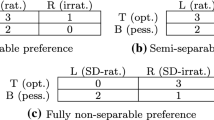Abstract
We analyze binary choices in a random utility model assuming that agent’s preferences are affected by conformism (with respect to the behavior of the society) and coherence (with respect to identity). We show that multiple stationary equilibria may arise and that the outcome looks very different from a society where all the agents take their decisions in isolation. We quantify the fraction of agents that behave coherently. We apply the analysis to sequential voting when voters “like to win”. Compared to the present literature, we enrich the setting assuming that each voter is endowed with an ideology and we consider the interplay between coherence and the desire to vote with the (perceived) majority.
Similar content being viewed by others
References
Akerlof G (1980) A theory of social custom, of which unemployment may be one consequence. Q J Econ 94: 749–775
Akerlof G (1997) Social distance and social decisions. Econometrica 65: 1005–1027
Akerlof G (2007) The missing motivation in macroeconomics. Am Econ Rev 97: 5–36
Akerlof G, Kranton R (2000) Economics and identity. Q J Econ 115: 715–753
Akerlof G, Kranton R (2005) Identity and the economics of organizations. J Econ Perspect 19: 9–32
Akerlof G, Kranton R (2008) Identity, supervision, and work groups. Am Econ Rev 98: 212–217
Akerlof G, Kranton R (2010) Identity economics: how our identities shape our work, wages, and well-being. Princeton University Press, Princeton
Austen-Smith D, Banks J (1996) Information aggregation, rationality and the condorcet Jury theorem. Am Polit Sci Rev 90: 34–45
Barucci E, Tolotti M (2009) The dynamics of social interaction with agents’ heterogeneity. Working paper series of the Department of Applied Mathematics, University Ca’ Foscari Venice 189/2009
Bass FM (1969) A new product growth for model consumer durables. Manag Sci 15(5): 215–227
Bernheim D (1994) A theory of conformity. J Polit Econ 102: 841–877
Blume L, Durlauf S (2003) Equilibrium concepts for social interaction models. Int Game Theory Rev 5(3): 193–209
Bowles S (1998) Endogenous preferences: the cultural consequences of markets and other economic instituttions. J Econ Lit 36: 75–111
Brock W, Durlauf S (1999) A formal model of theory choice in science. Econ Theory 14: 113–130
Brock W, Durlauf S (2001) Discrete choice with social interactions. Rev Econ stud 68: 235–260
Callander S (2007) Bandwagons and momentum in sequential voting. Rev Econ Stud 74: 653–684
Callander S (2008) Majority rule when voters like to win. Games Econ Behav 64: 393–420
Carayol N, Dalle J-M (2007) Sequential problem choice and the reward system in open science. Struct Change Econ Dyn 18(2): 167–191
Cont R, Löwe M (2010) Social distance, heterogeneity and social interactions. J Math Econ 46: 572–590
Cooper R, John A (1988) Coordinating coordination failures in Keynesian models. Q J Econ 103: 441–464
Dai Pra P, Runggaldier WJ, Sartori E, Tolotti M (2009) Large portfolio losses, a dynamic contagion model. Ann Appl Probab 19(1): 347–394
Dasgupta S, Randazzo K, Sheehan R, Williams K (2008) Coordinated voting in sequential and simultaneous elections: some experimental evidence. Exp Econ 11(4): 315–335
Glaeser E, Sacerdote B, Scheinkman J (1996) Crime and social interactions. Q J Econ 111: 507–548
Hung A, Plott C (2001) Information cascades: replication and an extension to majority rule and conformity rewarding institutions. Am Econ Rev 91(5): 1508–1520
Jones S (1984) The economics of conformism. Blackwell, Oxford
Knight B, Schiff N (2010) Momentum and social learning in presidential primaries momentum and social learning in presidential primaries. J Polit Econ 118: 1110–1150
Pareto Vilfredo (1920) Trattato di Sociologia Generale.
Sobel J (2005) Interdependent preferences and reciprocity. J Econ Lit 43: 392–436
Stigler G, Becker G (1977) De gustibus non est disputandum. J Polit Econ 67: 76–90
Van den Bulte C, Joshi YV (2007) New products diffusion with influentials and imitators. Mark sci 26(3): 400–421
Veblen T (1899) The theory of the leisure class: an economic study of institutions. MacMillian, London
Author information
Authors and Affiliations
Corresponding author
Additional information
We thank two anonymous referees for helpful comments, the usual disclaimers apply. We acknowledge the financial support of the Italian Research Grant: PRIN 2008, Prot.2008YYYBE4.
Rights and permissions
About this article
Cite this article
Barucci, E., Tolotti, M. Identity, reputation and social interaction with an application to sequential voting. J Econ Interact Coord 7, 79–98 (2012). https://doi.org/10.1007/s11403-011-0083-0
Received:
Accepted:
Published:
Issue Date:
DOI: https://doi.org/10.1007/s11403-011-0083-0



